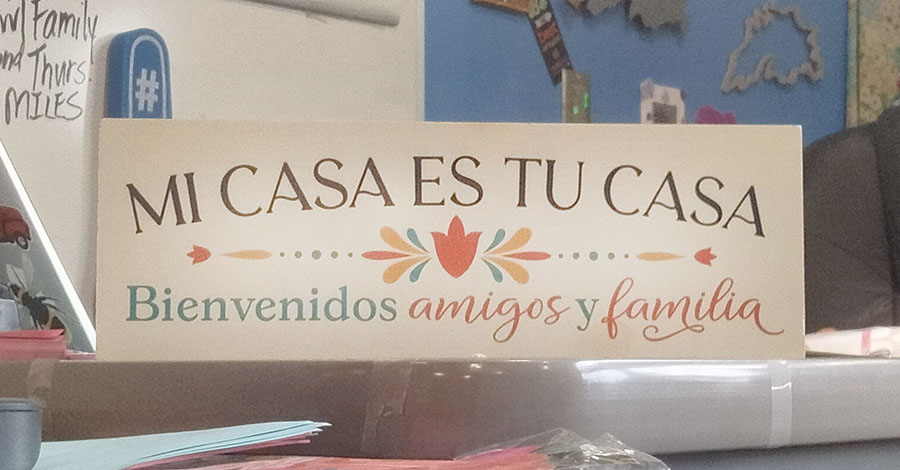Why Spanish teachers believe language education is important
A sign reading “my home is your home, welcome friends and family” in Spanish sits on Spanish I teacher Allison Conley’s desk.
October 24, 2022
Allison Conley, Maria Valley, Kim Smith, and most recently, Mikayla Guski, are all new Spanish teachers. Each began teaching at different points in their lives. Conley began at the age of 23, teaching Spanish to students from kindergarten through fifth grade.
“I decided to go into teaching, and that I also come by honestly, because I come from a family of educators that really value education, and I knew that I could do it. I’m just very passionate about sharing my passion with students, and hoping to inspire them in their own journey of using the language,” Conley said.
Guski is the newest Spanish teacher, she came back to the school where she attended and initially was taught Spanish.
“We are constantly migrating and changing our culture, and our culture is being influenced by other cultures. So in order to be interculturally competent, to be able to communicate with people in other cultures with respect and dignity, we need to learn language,” Guski said.
Despite many opportunities to learn more about culture and language, some Spanish classes are half filled, as not many students sign up to learn a foreign language.
“I feel that it’s sad and preventable, actually, and when I teach this group, high school age group, and if we ever happen to have a foreign exchange student who comes from another country, for example we have two, or when my students have an opportunity to meet someone who is young like them, and learn that they can speak three or four, or even five languages, they simply can’t believe it,” Conley said.
“For every day that we do that, we are losing culture, we are losing folktale, we are losing stories and history, and information about people’s cultures,” Guski said.
“In the United States, you don’t have to learn any other languages, you can function just fine. But, if you think about countries like in Europe, you’ve got so many languages that you kind of almost need to be able to communicate,” said Kim Smith, teacher for Spanish I through V.
The teachers say that learning a language brings multiple cultures together, and prevents people from discriminating against things from certain cultures that they don’t understand.
“We need to spend a lot more time embracing the similarities than pointing out the differences, because there are certain things that make the Spanish culture unique and fascinating, and we can certainly learn about that,” Conley said.
Foreign language class also allows some students to connect with family who are from different roots. Sophomore Syd Antcliff takes Spanish II with Valley.
“I want to make a career out of [Spanish] and connect with some of my family in Puerto Rico. I do think it’s important. You kinda need to learn a language to get ahead,” they said.
Chris Pascone is an English Language Learning Assistant for foreign-exchange students in the district. Pascone is able to fluently speak French and Russian.
“I got into this field more or less as a result of my lifestyle, because I lived abroad for 14 years. I lived in St. Petersburg, Russia, and there was a demand for English teachers, but a very short supply of English teachers,” Pascone said.
Guski encourages her students who wish to take on the language on their own to not gleam over their errors, and that perfection in a language shouldn’t be something to reach for, as even native speakers make multiple errors a day.
“The biggest recommendation I have is, you are going to make so many mistakes. So many. You are going to feel embarrassed, you will feel like, ‘oh my gosh, I will never learn this.’ You will feel upset, you’re going to want to throw in the towel and quit, because I was that student once,” Guski said. “You’re never going to get to a point where you’re like, ‘I’ve mastered it.’”



